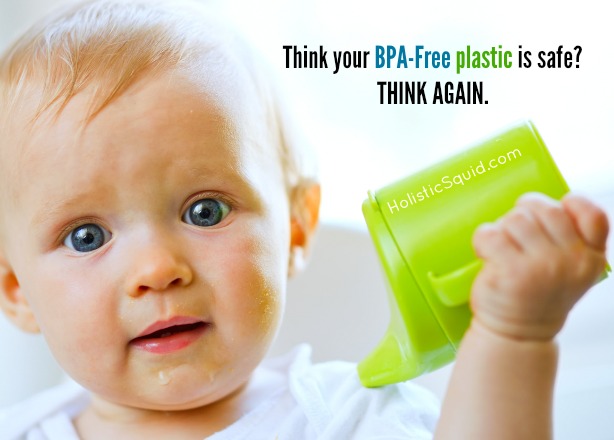
If you're anything like me, you probably avoid most plastic stuff because it's not only awful for the environment, but can leach hormone disruptors into our water, food, and ultimately, our bodies. Many of these issues have been blamed on a chemical called bisphenol-A (BPA) which can be found in plastic food containers, linings of metal food cans, and even baby bottles and pacifiers.
You've probably found some great BPA-free alternatives – specifically, I use tomatoes and tuna in BPA-free cans – but you may have re-usable water bottles or give your kids sippy cups or lunch containers that are touted as BPA-free plastic.
SO… You may also be appalled to learn that BPA-free plastic isn't safe after all.
I know I am, but I guess I'm really not surprised either.
Why BPA-free plastic is a problem
BPA-free plastics are turning out to be just as dangerous as the products they've replaced. A peer-reviewed study published by Environmental Health Perspectives revealed that almost all plastics, no matter what type (BPA-free or not) were found to leach estrogen disruptors. In fact, some BPA-free products actually released more harmful chemicals than the original products that clearly contained bisphenol-A. (source)
So why is harmful plastic still being used?
Basically, regulating the safety of plastics is a political mess.
One glaring problem is that the laws governing chemical manufacturing do not require new chemicals to be safety-tested before they go on the market. Companies are rarely required to collect or disclose safety data: these chemicals are just presumed to be safe until proven otherwise, often after damage is already done. (source)
Because of this, it is virtually impossible to even know the exact chemical composition of any commercially available plastic part. A plastic item like a baby bottle can contain almost 100 undisclosed chemicals, so a product labeled as BPA-free (or free of any other known toxin) may still have component parts that actually contain harmful chemicals anyway. (source)
According to Michael Green, director for the Center for Environmental Health, “Corporations that come under pressure to root out toxins often replace them with untested chemicals, which sometimes turn out to be just as hazardous.”
On top of all of this, research is often biased because companies pay laboratories to misrepresent the testing, or use outdated studies to prove points that are in their favor.
What about silicone?
Silicone on its own is an inert element that is safe to land, aquatic, and soil organisms. That said, silicone is quite new to the market as a replacement for non-stick baking gear and in place of plastic food storage, baby bottle nipples, etc. As such, we can't be certain that the components used with the silicone are safe.
I hate to say this, but as much I love my French Silpat baking mats, silicone may fall into the same boat of risk as plastics due to similar “unknowns.” I won't be using any brightly colored silicone muffin cups. But I still think that medical grade silicone is a decent alternative when it comes to sippy cup spouts and baby bottle nipples.
There are also these 100% natural rubber nipples.
As for my Silpat baking mats, I haven't yet decided, since parchment paper is also lined with a thin layer of silicone.
Check out this mama's exploration of the research and decide for yourself.
Is all this plastic drama really that big of a deal?
Over 130 studies have linked BPA exposure to health concerns such as breast cancer and obesity. Mammals are especially vulnerable to these estrogen altering plastics, resulting in hormonal issues that range from early puberty in females and fertility problems to increased cancer rates – especially breast, ovarian, testicular and prostate. (source)
Not only do these endocrine-disrupting chemicals cause disease, but new research suggests that they may be altering genes in a way that can increase likelihood of disease in offspring as well. A biology professor from the University of Missouri-Columbia, Fredrick vom Saal, states, “A chemical like BPA reprograms your cells and ends up causing a disease in your grandchild that kills him.” (source)
Time to break up with plastic for good
We can basically assume that any type of plastic can be potentially harmful. So the question then remains, how can you protect yourself, your family, and the environment against the problems of plastic?
I don't know about you, but rather than lobby for better regulations over plastics, I'd rather vote with my dollar and avoid plastics as much as possible.
Here's what I suggest:
Use glass or stainless steel instead of plastic for food serving and storage
- Glass food storage – I use this set and lots and lots of mason jars (making sure not to have hot food touch the lids)
- Stainless steel lunch boxes – We have several of these on rotation
- Reusable bottles – This is my favorite insulated stainless steel bottle and I also love these silicone sleeved glass bottles
- Party or picnic – Go bamboo with these utensils that can be used again and again before they are ready to be composted
- Baby gear – Natural rubber pacifiers, stainless steel sippy cups, glass baby bottles, and medical grade latex bottle nipples are currently the best options available
Packaged food alternatives
While most packaged food is nasty junk that you should be skipping anyway, there are certain things that are still convenient, that I consider to be healthy (if we can avoid toxins from packaging).
You can find out if your favorite canned foods are lined with BPA on this list. But the best choice to avoid toxicity from plastics is to go with glass jars.
Unfortunately, those handy eco-friendly tetra packs fall in the same miscellaneous category as silicone: unknown – read more here.
Be aware of hidden sources of toxic plastics
Before you agree to teeth sealants, you may want to ask your dentist about the material that he/she will be using. Many are known to contain BPA, let alone unknown plastics.
Thermal receipt paper (you know, the one that babies like to grab and chew on as you check out of the grocery store?) is coated with BPA. Wash your hands after handling thermal receipt paper and keep them away from kids, or better yet, go paperless whenever possible.
Now, I didn't write this to get y'all freaked out about plastic, plastic everywhere.
The purpose of this post is to shed some light, not paralyze you.
To be 100% honest, I'm not going to stop buying my favorite canned tomatoes, my coconut oil in hard plastic, or my coconut milk in tetra packs. Use the 80/20 rule or you will go cuckoo.
Use this information, start talking and reading, and decide for yourself where you draw the line with BPA-free plastics and other modern substances that we take for granted as being safe.
Will you avoid BPA-free plastic or ignore these issues and hope for the best?



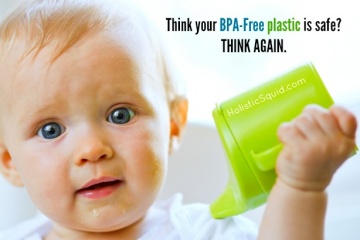
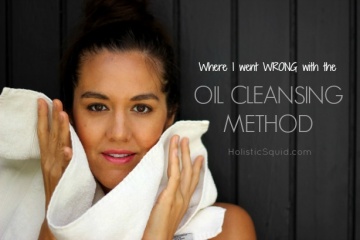
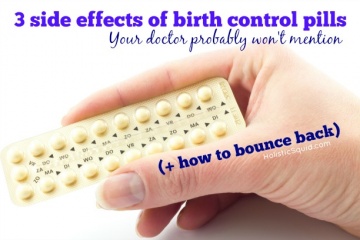
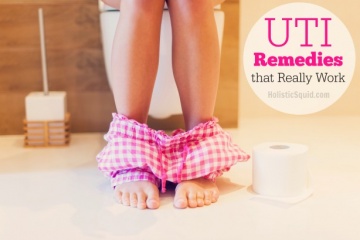
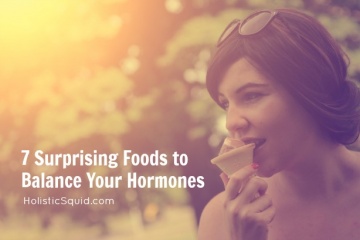
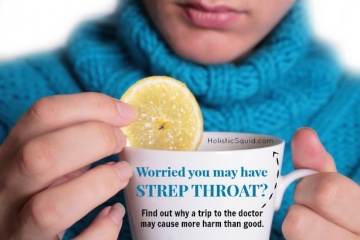
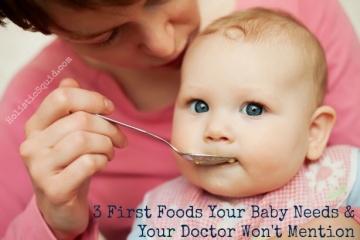
I am starting to lose my mind. Honestly. I buy reverse-osmosis filtered water from my local co-op. I use a refillable 2 gallon water jug with a spigot. It’s BPA-free. I thought I was doing the right thing…My kids drink the whole 2 gallons in a day and a half. I’m trying to avoid fluoride. I switched to glass storage containers and the kids use stainless steel water bottles. I use almost zero plastic, but obviously my meats come in plastic and I don’t have the room in my freezer to repackage in glass, not to mention it’s already been exposed to the plastic. Some of my veggies come in plastic, and even fresh veggies at the store have those plastic bags in which to pack them for purchase. My family thinks I’m paranoid. I’ve become the conspiracy theorist. It takes more energy and time to protect my family from “healthy” stuff than it should. It seems like everything I’ve been taught my entire life was wrong. It is so frustrating! Anyone else losing it?!?
Cassi, you sound like me. I’m losing my mind, too. I try so hard to feed my family safe, nutritious food, and unfortunately, I my efforts aren’t good enough. The more I learn, the more freaked out and crazy I become.
Hi Cassi – You make a great point. In the beginning, this is exactly how I felt. All we can do is the best we can, and things will most likely fall by the wayside. Nobody is perfect. 🙂
There’s lists of “how to store produce without plastic” that can be found in Google. Meat can come in butcher paper from the deli, and there are reusable produce bags on Amazon, or you can knit your own.
I really try not to use plastic for anything related to my kids. But it’s getting really frustrating when one thing is more dangerous than the next.
I’m just waiting for them to say that stainless steel is harmful…
There are many grades of stainless steel. Regular stainless steel cookware is made from different alloys including scrap metal. “Most stainless steel sold in stores is of such a nature to allow chrome and nickel to bleed into the foods as the salts and acids of the food react with the pot.” Dr. Shelton. For cleanliness and safety reasons, you food should be cooked on only high -grade surgical stainless steel.
what are yr thoughts about HDPE plastic?
i thought HDPE was the only actually safe plastic
Hi Sanae- I’m not very familiar with it, but I like to avoid things made with petroleum.
Many clothings, towel, bedsheets, wool are made from petroleum by products. Plastic, nylon, polyester, acrylic, etc
White glue, school glue, dyes, toothpaste, skin care, shampoo, body wash, cream, gel, lipstick, etc
Shoes, boots, slippers
Sunshades, visor, sunglasses, plastic jewelleries, umbrella
Mobile phone, laptop, computer
The list goes on…
I was wondering what you do for coconut milk. I have a vitamix for homemade but don’t like that it is plastic and the water and dried coconut are supposed to be warm when blended. Vitamix is BPA free but obviously not chemical free! My other source is natural value organic canned coconut milk. Again bpa free but does that say much? I am assuming same goes for the lining of cans.
Hi Sandy – I wouldn’t worry about the Vitamix, since things aren’t in there for very long. As for the coconut milk, it’s fine for us to use bpa-free cans occasionally, as long as the bulk of our diet isn’t coming from cans 🙂
We use the Dr. Browns Glass bottles because they are the only glass bottles that are made in America. We did not want to use evenflo as these are made in china and there are more healthy issues in regards to products made in china.
I do as much as possible but I’m not giving up certain things. I milk goats and freeze the milk for winter. It is frozen, after chilling in gallon plastic bags. I can’t tell u how many half gallon jars I broke before I said screw it and went to bags. I don’t store hot food in plastic. I don’t drink bottled water because of how hot the trucks get in summer. I don’t use much plastic period except for mainly bags. We also butcher chickens which go in gallon or food saver bags. I have a huge garden that I put up and many items go in bags. So, do I freak out no. Am I giving up all plastics, heck no. And, I couldn’t afford to purchase glass for.everything or the freezers all that glass would require. I have 4 going already!! Had heard this and wasn’t surprised. Since “when has our corporations given a rats behind about people instead of the almighty dollar.
Doesn’t glass also contain BPA? I’ve seen that around and would like to know if all glass is safe or only certain kinds.
Thanks.
Hi Kinga – Thanks for your comment. Glass doesn’t contain bpa, but we have to be careful of the lids. These lids are bpa free: http://holisticsquid.com/BallJarLids
I use the Silpat because all of my baking sheets are aluminum. (In fact, I don’t know if I have ever seen stainless baking sheets.) Since silicone *might* have toxicity, but aluminum certainly does, I am keeping it until I can figure out a better solution. But as for plastic, I have suspected for years that all plastics are toxic. My in-laws eat mostly organic on one hand, but on the other they not only use a ridiculous amount of plastic, they also microwave food in plastic. Tt drives me crazy.
There are stainless steel baking sheets on Amazon! Under the brand ‘Norpro’.
I use very little plastic, I don’t ever use it in the microwave, and I really use the microwave only when I have to to reheat my husbands food as he likes the microwave. I reheat my food in a pan on the stove. I found some very nice glass containers for storing food in the fridge they do have snap down plastic lids, but I never fill them full enough for the food to touch the plastic and always wait until the food is cold to fill the glass containers. I do use freezer bags and I do know that is chancy, but I did not know that parchment paper had a silicone coating on it. Tysm for stating that. I gave up using my silpats because I just didn’t trust them. The first few times I used them they gave off such an odor. For water, I do buy Crystal Geyser in 1 gallon bottles and then when I open a bottle I pour the water into my GT Kombucha Tea bottles that I save just for that purpose. I can’t make my own Kombucha in this house, it is full of mold and every time I have tried my poor scoby died from the mold, so I have an abundance of Kombucha Bottles that I use for various purposes. I also use canning jars for food storage and water bottles. I love the ones with the handles. I wish we could get a lobby together to make manufacturers quit using plastic and go to all glass or stainless steel, but I suppose that is too much to ask for. It would be so much better for the planet and the humans and others critters living here. Thank you for the article, I knew we weren’t safe, but it is nice to know someone else thinks so too.
I’m learning not to use plastic. I try to use as much glass as possible. I would like to think that stainless steel is great, but it seems (for newer products) even if the item is manufactured in the US, I have seen that they use metal produced in China. I just don’t trust the Chinese government especially when they have purposely poisoned their own people. They certainly don’t have much love for the Americans. As you said, we just need to do the best we can and not become paralyzed by all the possible threats in our world. There is still a lot that is good and we can be thankful for what we do have.
hi popping over from pinterest.
after all the bpa free hype i was actually wondering when people will start asking questions about what is in the plastic now instead of the bpa to give it the same qualities. and now
slowly new research coming to proof that i suspected all along… different chemicals, with similar or worse health hazards.
the only way is to avoid plastic as much as possible…
We use mostly glass or stainless steel where it is safe. There are a few situations where glass is just too iffy, esp with kids.
I don’t’ think silicone is good either. I bought a baking sheet…used it once and threw it in the trash. It smells bad when using and if it stinks….we don’t use it!!
I’ve almost broken up with plastic. My last hold out is plastic baggies and I’m exploring other options for these, but I think if nothing else I’ll be drastically reducing my usage.
The thing that concerns me most about plastic is how it’s found everywhere! Even in cans and sometimes lined in containers thought to be safe. Since it’s an environmental toxin that can add to the toxic load babies and children are already under from vaccines, medications and sometime poor diet I’m concerned for the health of our children. No one really knows the full impact of toxins leaching into our food and beverage! It’s quite frightening!!!
Thanks Emily for bringing awareness to this issue and proposing easy and safe alternatives. 🙂
~ Robin
SO I have a 5 gallon BPA free water jug that I fill up with reverse osmosis water with added minerals to it—what do I use instead of this for my water??
Hi Mirror Time – Thanks for your comment. It might be worthwhile to use the jug to transport the water. If the water isn’t sitting that long in the jug, it may not be an issue. If it’s sitting in the sun, that would be a problem. Until they make a stainless steal water jug of that size, you will have to compromise on whats available and what’s realistic for you. Hope that helps!
For everyone’s information:
The authors of the Environmental Health Perspectives study cited in the first reference own the companies PlastiPure and CertiChem. Eastman Chemical (another plastics producer) filed and won a trademark infringement lawsuit against them regarding this specific study, asserting that they had “engaged in unfair commercial competition, waging a media campaign against the Tennessee company [Eastman] in trade journals, news articles and press releases, while PlastiPure rolled out its own line of similar goods.”
I’m not saying plastics are safe, or that the huge chemical company is beyond reproach, but there’s clearly a conflict of interest. The results of the EHP study had a direct positive influence on the company founded and owned by the authors of the study. That’s the very definition of a conflict of interest, and is probably why the study wasn’t published in a more prominent journal.
Great post! just because something is labelled BPA Free or anything else doesn’t mean it has been tested properly. I was appalled when I was recently shopping in Target (Australia) and came across underwear that was stating proudly it was partly composed of recyled plastic bottles, there would be no way in the world I would want that on my skin for hours on end! and I can only imagine the amount of chemicals that went into the environment to turn a piece of plastic into fabric! This world definately has lost the plot!
My attitude is Plastic is Toxic… Period! I don’t care if it’s touted as “safe” or not. Even if it doesn’t contaminate my food or home, making it contaminated the air, the land and more than likely the water. And chances are, since we don’t have recycling here, it’s going to sit in a landfill til the world ends… Nope, it’s just not worth it. I’m not perfect, but if I can avoid plastic, I do.
Totally agree… but what do you use for homemade popsicle molds? That’s the one plastic we are using…
Hi Lindsey – Great question! These are the kind we use: http://holisticsquid.com/PopsicleMolds
We really need this information. Thanks you so much. I posted a link to your post on my site.
I have seen a few people here speak of using metal in place of plastics, so I thought I would mention the following- I have read in several places that radioactive scrap metal from military what-not used in the Gulf Coast, from US nuclear plants, & from China & India, is sold to factories in the US, or used in international factories, ending up in silverware, tissue boxes, belt buckles, medical equipment, etc. Emitting low-level radiation capable of causing cancer, birth defects, etc., it is able to make a home minorly radioactive. So I try to avoid metal as well, when possible, or to use vintage kitchen ware.
Any advice on what kind of containers we can use to hold our homemade shower stuff, Chapstick, toothpaste, etc since many of the recipes for those items have you putting them in plastic containers?
Ugh goodness , what should I do about my water then? I usually buy Kiwaii water , I guess they switched their names to True Zealand. Anyways, they claim to be BPA free. Now I’m seeing that it is all a lie. My anxiety is acting up reading this .
How should I get my drinking water now? I only drink spring water . Where do I get my drinking water ???????? :/ ? Any tips , links ? Anything ?
Hi Sydney, I would strongly suggest getting a water filter. Here is a post with all the info you would require. I would also suggest storing/drinking your water out of glass or stainless steel instead of plastic.
Would these plastic concerns include Distilled water sold in supermarkets or anywhere else for that matter?I’ve been told that distilled water is pure water and MUST be clean/pure simply because it is used in Dialysis machines.
Fake news?
Piece of writing writing is also a fun, if you know after that you
can write otherwise it is complicated to write.